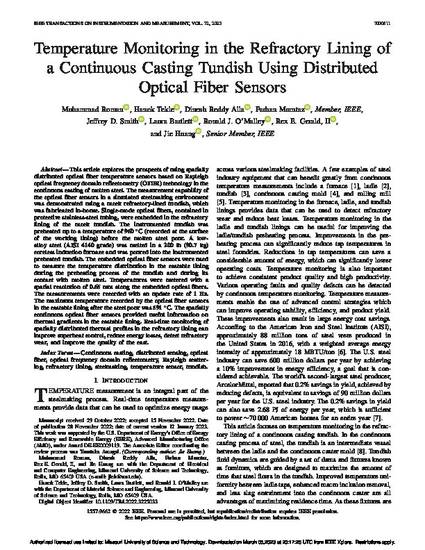
This Article Explores the Prospects of using Spatially Distributed Optical Fiber Temperature Sensors based on Rayleigh Optical Frequency Domain Reflectometry (OFDR) Technology in the Continuous Casting of Molten Steel. the Measurement Capability of the Optical Fiber Sensors in a Simulated Steelmaking Environment Was Demonstrated using a Mock Refractory-Lined Tundish, Which Was Fabricated In-House. Single-Mode Optical Fibers, Contained in Protective Stainless-Steel Tubing, Were Embedded in the Refractory Lining of the Mock Tundish. the Instrumented Tundish Was Preheated Up to a Temperature of 960 °C (Recorded at the Surface of the Working Lining) Before the Molten Steel Pour. a Low-Alloy Steel (AISI 4140 Grade) Was Melted in a 200 Lb (90.7 Kg) Coreless Induction Furnace and Was Poured into the Instrumented Preheated Tundish. the Embedded Optical Fiber Sensors Were Used to Measure the Temperature Distribution in the Castable Lining during the Preheating Process of the Tundish and during its Contact with Molten Steel. Temperatures Were Metered with a Spatial Resolution of 0.65 Mm Along the Embedded Optical Fibers. the Measurements Were Recorded with an Update Rate of 1 Hz. the Maximum Temperature Recorded by the Optical Fiber Sensors in the Castable Lining after the Steel Pour Was 591°C. the Spatially Continuous Optical Fiber Sensors Provided Useful Information on Thermal Gradients in the Castable Lining. Real-Time Monitoring of Spatially Distributed Thermal Profiles in the Refractory Lining Can Improve Superheat Control, Reduce Energy Losses, Detect Refractory Wear, and Improve the Quality of the Cast.
- Continuous casting,
- distributed sensing,
- optical fiber,
- optical frequency domain reflectometry,
- Rayleigh scattering,
- refractory lining,
- steelmaking,
- temperature sensor,
- tundish
Available at: http://works.bepress.com/jie-huang/221/

U.S. Department of Energy, Grant DE-EE0009119